#studying chinese
I did so well in my exams, I’m super happy about it hard work gets you places! Earn it!
我高兴极啦啊啊啊啊啊啊啊啊啊啊啊

I feel like I’m doing nothing but studying right now haha. I finished my first exam, I think it went well. Now I’m studying a lot for my oral exam, which is a little complicated. I’m preparing sentences for all subjects I might draw. It’s really nervewrecking. I just have to continue working dilligently. 10 more days to go!
我每周有演示,老师一直告诉我 “你的语法很好,句子也不错,但你必须努力提高你的发音”。让我感到很快乐,因为老师觉得我的演示很好,但我也有点担心,什么时候才能提高?今天是我最后的课,有了演示。演示完了以后,老师对我说:“你的语法很好,句子也不错,说了很清楚,发音没问题”。我这么高兴!努力了,回报定会有!(^‿^)
Around every week I have a presentation, and my teacher always tells me “your grammar is very good, there’s no problem with the sentences, you understand the text very well, but your pronounciation needs work”. This is good feedback, but my pronounciation is never right! Today my teacher told me the above, but also that my pronounciation is good and speaking is very clear, I feel so happy! I worked so hard, and it paid off. We got this, everyone! Work hard and you will be rewarded, 加油!

| 12月8日 | 100/100 Days of Productivity |
我的考试在一月之后。我要从一月初开始努力学习。我的考试又在网上了。我希望尽我所能~
Aaand that’s a wrap! I’m totally in a christmas mood lately - we got a christmas tree, made decorations, baked christmas cookies and I’m almost done with all of the christmas presents for my family and friends.
My exams are not before january. I might be on a slight hiatus until then, posting about my christmas perhaps, as a sort of diary instead of this “challenge”. I’m going to study very hard starting from early january. My exams are once again online. I hope to do my best! Thank you to anyone who joined me for my *failed* productivity challenge! (⭒•͈ •͈ )
| 11月30日 | 92/100 Days of Productivity |
大家好!我最近很忙,我学了很多语法。我觉得语法特别难,但是很有意义。我可以看到我在进步,这很令人兴奋!简单趋向补语,复合趋向补语,可能补语,描述补语,程度补语,数量补语,(动量补语,时量补语,名量补语)。。。我的大脑被炸了!
Recently I’m learning a lot of grammar, it’s really hard but also very rewarding! There’s so many complements in Chinese grammar, it’s really hard to remember them all! 加油!

| 11月20日 | 82/100 Days of Productivity |
哇啊啊啊啊,最近我这么忙!考试快要到了,我太兴奋了!I’m looking forward to try my best~我今天心情很好,我做了三个星期的作业!希望大家保持健康和快乐。( ̄▽ ̄)ノ
Exams are coming~ I did so much work today, 3 weeks worth of homework (been feeling not too good recently..). Hope everyone are doing well!
粮食
I like grains, here we traditionally eat rye and oat, oatmeal for breakfast & ryebread for lunch. I like the Chinese name for my country, 丹麦。丹dān is a sofisticated word for red, 麦mài means grains. 丹麦~dānmài~Danmark The translation both contains phonetic and semantic (red flag & farming country) value, ~音译+意译!

| 11月7日 | 69/100 Days of Productivity |
今天我在为1月份考试的话题做讨论。上图是本周的课文阅读。这么多新词!我淹没在作业里啊~
Today I’m working on topic discussion for my exam in january! The above picture is this week’s text reading. So many new words! I haven’t been studying as much as I usually do, which has affected my handwriting.. (▰˘︹˘▰)

| 10月29日 | 60/100 Days of Productivity |
今天是我的生日!祝自己生日快乐~我不想在课外做太多的功课,只是想庆祝一下。毕竟这是吃美食的借口~
Today is my birthday! I didn’t want to do too much school work outside classes, just wanted to celebrate. It’s an excuse to eat good food, afterall Have a great day!

| 10月28日 | 59/100 Days of Productivity |
今天很忙!做了很多家务,为明天的生日做了很多准备。我快21岁了!我要独自跟我的栗子动物和中国外卖庆祝,哈哈! 我周末散步时拍的这张照片。看看那些秋天的颜色。惊艳!
Today is really busy! Had a lot of housework, and a lot of preparation for my birthday tomorrow. I’m turning 21! I will celebrate it home alone with my chestnut animals and chinese takeaway, haha! I took this picture this weekend, the autumn colours are breathtaking!

| 10月27日 | 58/100 Days of Productivity |
最近我的精神状态不太好,但我会尽我所能克服它。我和家人度过了一个美妙的周末,收集栗子!在这里我们有秋天用栗子做动物的传统!很有趣。 (´ • ᴗ • `)
Lately I have not been feeling really good mentally, but I try my best to work through it. I had an amazing weekend with my family!Yesterday I had an online class, they really never even reach the quality of normal classes, it’s so demotivating! I hope they continue to have physical classes.
Question of the day: What are you the proudest of out of all the assignments you’ve ever had? Let me tell you something funny, earlier this year I was clearing my apartment to move, so I was going through old school assignments and I came across some from elementary school. I picked up one and read something along the likes of “this paper is extraordinary, the details and research is far above someone your level. I especially think that the details on the menstrual cyclus were fantastic, etc.”. This teacher used to dislike everyone and she praised my menstrual cyclus so much, it was hilarious! I’m indeed very proud of my menstrual cyclus. Thanks for the top grade ( ´∀`)/

| 10月17日 | 48/100 Days of Productivity | ☕️
这个星期我很忙。我去看见很多人,参观很多地方。我没有时候做作业!(我其实只是不要做任何作业(ノ∀ ̄〃))我最后买了新干花~
I have seen so many people this week, so busy! I finally did some homework - big mistake waiting so long( ´∀`)and look, I bought dry flowers for my decorating!
Question of the day: Are you a part of any clubs? I’m a part of a think tank on China that also plans the weekly China Cafés at my school. Sadly, there hasn’t been any this semester, due to obvious reasons. I do hope we can continue them next year, it’s really great practicing Chinese with natives, while hanging out with coffee/tea ☕️

| 10月13日 | 44/100 Days of Productivity |
大家好,因为这周是秋假,我没怎么学习,打了很多英雄联盟,,,, (;´Д`)但是!我今天准备下周一的报告。我要谈谈中国菜。你最喜欢的中国菜是什么?我的是面条或者鱼香肉丝。我非常喜欢做中国菜 - 你可以看看上面的照片,大部分是我做的 。^‿^。
I haven’t posted in a while! It’s autumn vacation, so I’m playing a lot of League of Legends, and forgetting to study ah! Today I worked on my presentation for monday, it’s about Chinese food. What is your favourite Chinese dish? Mine’s either any kinds of noodle dish or 鱼香肉丝, both bring me so many happy memories!
Question of the day: Career goals? While I’m not for certain what I specifically want to work with, I do want to work with cultural exchange and communication, preferably between my own country and China. However, I do see myself taking business related classes, as that’s just the most convenient way to get jobs related to the country with one of the strongest economies, unfortunately.

| 10月6日 | 37/100 Days of Productivity |
今天我发现,我看错了!我做了错误的作业,所以我需要做很多作业。幸亏我喜欢做作业,所以不太麻烦,不然我认为我现在要死。。。
Today I realized I made the wrong homework for this week, so I had to do much more work than normal. Luckily I like to do homework, so it’s not a big problem.
Question of the day: Do you have pre-test rituals and what are they? A good meal and coffee, hehe

| 10月3日 | 34/100 Days of Productivity |
我今天读了一些关于中国历史和文化的文章,读了同时记笔记。今天是轻松的一天~ (ᴗ˳ᴗ)
Today I read some articles about some history/culture related topics because I’ll be taking a class like that next semester. These are week 40’s notes, I’m particularly proud of my very bad doodle of a 四合院 ( ´∀`)
Question of the day: Are you a doodler? I used to not be one, but I would describe myself as a doodler now! It makes my notebook more fun to open and look at, so why not? Even though my doodles are not very nice, haha;;

| 10月1日 | 32/100 Days of Productivity |
中秋节快乐!Today we reunite with our family, eat moon cake, look upon the moon and wish for a long life.
Today is the Mid-Autumn Festival 中秋节 I hope everyone who celebrates are able to celebrate with their families
At 中秋节 Chinese people eat moon cakes 月饼, which traditionally are round 圆 like the moon, a symbol of reunion 团圆 and never seperating 分开. It resembles always being together with your family

| 9月29日 | 30/100 Days of Productivity |
中秋节快要到了,你们过了吗?我上周买了月饼 在这里它们一点贵,但是为了中秋节我觉得是划得来。
It is almost 中秋节, Mid-Autumn Festival This year it is celebrated on the 1st of October 2020, which is also, 十一 , the PRC National Day of China. During this festival, Chinese get together with their families and eat moon cakes and look upon the moon.
I promised you that I would share some poems with you. This is a poem about missing the family reunion of the festival. It describes how beautiful it is, in a quiet yet sad way. The sadness and longing is very prominent. I cannot celebrate the festival with my family this year either, so I feel deeply connected to this poem. I hope everyone who celebrates can be with their 家人 family (´。• ᵕ •。`) ♡


chinese inspiration/motivation post | more study content on my instagram account: thomreads

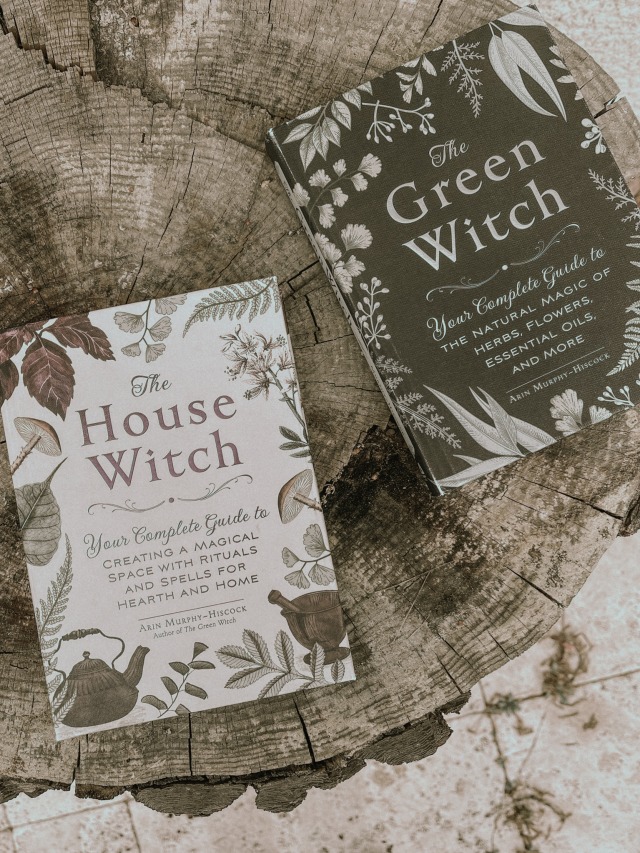






recent instagram posts | feel free to follow me there as well since i am way more active and share my studies in stories | ig: thomreads
According to this list, these are the top 10 surnames in China as of 2020*:
- 李 Lǐ
- 王 Wáng
- 张 Zhāng
- 刘 Liú
- 陈 Chén
- 杨 Yáng
- 赵 Zhào
- 黄 Huáng
- 周 Zhōu
- 吴 Wú
I’ve seen articles like this one discussing the regional distribution of surnames. I wanted to take a look myself and compare the top surnames in different provinces/municipalities. For instance, do any locations have a top 10 list that is the same as the overall country top 10? Which surname is ranked #1 in the most locations? Let’s explore and have some fun along the way.
*The top surnames for 西藏 Tibet are not included. I believe this is because the population is vast majority Tibetan.
1) Find how many surnames in a location’s top 10 are also in the national top 10.
Most in common

Arrows: grey = same as national rank, green = higher than national rank, red = lower than national rank
Circles: orange = in national top 10 but missing from top 10 of individual location, blue = outside national top 10
- 四川 Sichuan - 9/10 surnames
Missing: 赵 Zhào
Added: 罗 Luó - 贵州 Guizhou - 9/10 surnames
Missing: 赵 Zhào
Added: 罗 Luó
Fewest in common

- 浙江 Zhejiang - 6/10 surnames
Missing: 杨 Yáng, 赵 Zhào, 黄 Huáng & 周 Zhōu
Added: 林 Lín, 叶 Yè, 郑 Zhèng & 徐 Xú - 广西 Guangxi - 6/10 surnames
Missing list: 赵 Zhào, 黄 Huáng, 周 Zhōu & 吴 Wú
Added: 梁 Liáng, 韦 Wéi, 陆 Lù & 卢 Lú - 上海 Shanghai - 6/10 surnames
Missing: 刘 Liú, 杨 Yáng, 赵 Zhào & 黄 Huáng
Added: 朱 Zhū, 徐 Xú, 沈 Shěn & 陆 Lù
2) Find the average national rank for each location’s top 10 list.
OK, this section is a little confusing. Basically, I was thinking that just counting overlapping surnames this isn’t necessarily the best metric. When it comes to surnames outside the national top 10, just counting like I did above can’t distinguish a rank of 100 from a rank of 11! So I decided to take averages.
For each location, I found the national rank of the its top 10 surnames and averaged them. This should give me an idea of which location’s top 10 surnames collectively rank the highest in the whole country. If you add up 1-10 and divide by 10, you get an average of 5.5, so that would be the minimum possible average.
Lowest average
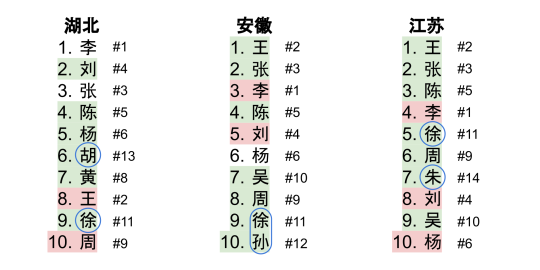
Highlighting: red = lower than national rank, green = higher than national rank, no highlighting = same as national rank
Blue circling = outside of national top 10
Annotated numbers = national rank
- 湖北 Hubei - 6.2 average
Outside national top 10: 胡 Hú & 徐 Xú - 安徽 Anhui - 6.3 average
Outside national top 10: 徐 Xú & 孙 Sūn - 江苏 Jiangsu - 6.5 average
Outside national top 10: 徐 Xú & 朱 Zhū
Highest average
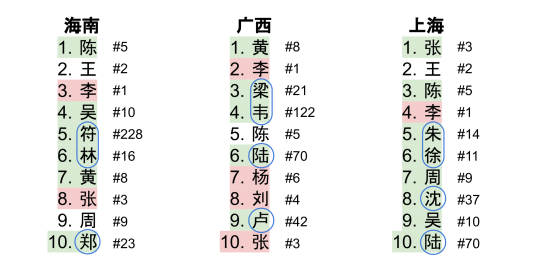
- 海南 Hainan - 30.5 average
Outside national top 10: 符 Fú, 林 Lín & 郑 Zhèng - 广西 Guangxi - 28.2 average
Outside national top 10: 梁 Liáng, 韦 Wéi, 陆 Lù & 卢 Lú - 上海 Shanghai - 16.2 average
Outside national top 10: 朱 Zhū, 徐 Xú, 沈 Shěn & 陆 Lù
3) Add the difference in rank of surnames for each location to create a composite score.
Then I started to think about order within the top 10. After all, a province for which 李 Lǐ ranks #10 should be treated differently from one where 李 Lǐ is #1. So I wanted to capture the difference between a surname’s national rank and its rank for individual locations.
For example, in 广东 Guangdong, 陈 Chén ranks #1, but it’s #5 in the whole country. The difference is 5 - 1 = 4. I did this for the other 9 surnames in 广东 Guangdong’s top 10 as well and added the numbers to get a composite score. Then I repeated this for the other locations.
I used absolute values—otherwise a positive difference and negative difference would offset each other! But I used + and - signs in the images below to show more information. You could also divided by 10 to get the average difference for the top 10 surnames each location.
Lowest score
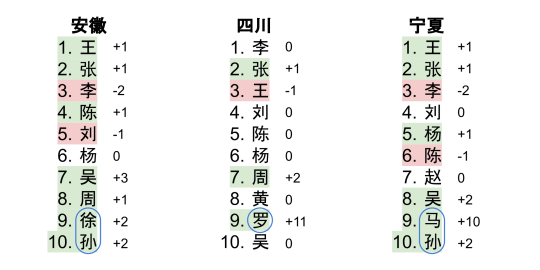
Highlighting: red = lower than national rank, green = higher than national rank, no highlighting = same as national rank
Blue circling = outside of national top 10
Annotated numbers = difference b/t national rank and local rank, with (+) indicating a higher rank locally and (-) indicating a lower rank locally
- 安徽 Anhui - 14 score
- 四川 Sichuan - 15 score
- 宁夏 Ningxia - 20 score
Highest score
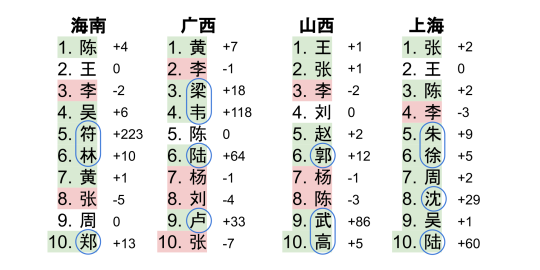
- 海南 Hainan - 264 score
- 广西 Guangxi - 253 score
- 山西 Shanxi - 113 score
- 上海 Shanghai - 113 score
4) For each location, determine how many surnames have no difference in rank.
As an extension of the above, for each location, I counted the number of top 10 surnames that had no difference in rank compared to the national rank. Let’s look closer at locations whose top 10 lists had the fewest changes:
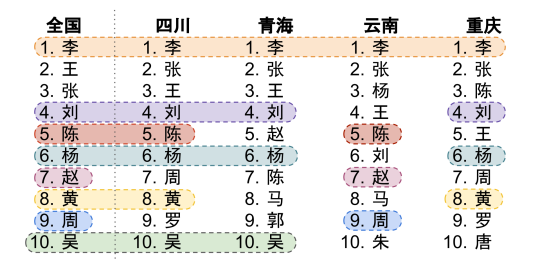
- 四川 Sichuan - 6 surnames
李 Lǐ, 刘 Liú, 陈 Chén, 杨 Yáng, 黄 Huáng & 吴 Wú - 青海 Qinghai - 4 surnames
李 Lǐ, 刘 Liú, 杨 Yáng & 吴 Wú - 云南 Yunnan - 4 surnames
李 Lǐ, 陈 Chén, 赵 Zhào & 周 Zhōu - 重庆 Chongqing - 4 surnames
李 Lǐ, 刘 Liú, 杨 Yáng & 黄 Huáng
I’ll also list the locations for which no surnames had the same rank as in the top 10:
- 广东 Guangdong
- 福建 Fujian
- 江西 Jiangxi
- 江苏 Jiangsu
- 贵州 Guizhou
Summary: Which location’s top 10 is closest to the national top 10?
We just saw several different ways of looking at this. Someone who is better at math than I am would probably devise a way to combine the different metrics into a single score. I’m just going to recap which locations we saw appear the most.
Overall most similar: 四川 Sichuan & 安徽 Anhui
Overall least similar: 广西 Guangxi, 上海 Shanghai & 海南 Hainan
5) Find which surnames appear on the most and least location top 10 lists.
This wasn’t something I was initially curious about, but after my analyses above, I grew curious. I’m just looking at the national top 10 surnames here. There are 30 locations total, so 30 is the highest possible number.

So 李 Lǐ and 张 Zhāng are the only two that appear in the top 10 for all 30 locations!
I also thought it would be interesting to see which locations are missing for the surnames that were close to 30/30:
- 陈 Chén - 29/30
Missing: 新疆 Xinjiang - 王 Wáng - 28/30
Missing: 广东 Guangdong & 广西 Guangxi - 刘 Liú - 28/30
Missing: 海南 Hainan & 上海 Shanghai - 杨 Yáng - 26/30
Missing: 海南 Hainan, 浙江 Zhejiang, 江西 Jiangxi & 上海 Shanghai
6) Which surname ranks 1st in the most locations?
This questions grew pretty naturally off of the question above. I spent far too long making this map to go along with the numbers!
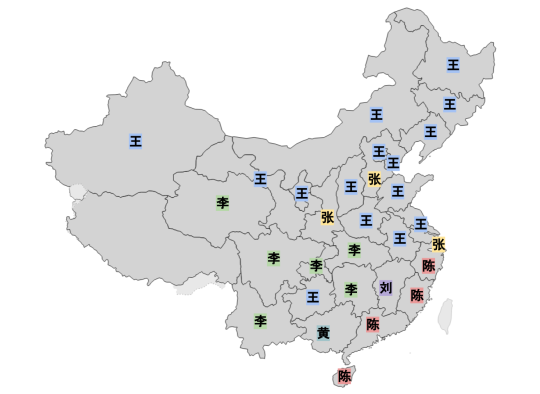
The winner is…王 Wáng with 15 locations! It’s so interesting to see how 王 Wáng is dominant in the north, 陈 Chén rules the southern coast, etc.
- 王 Wáng - 1st in 15 locations
- 李 Lǐ - 1st in 6 locations
- 陈 Chén - 1st in 4 locations
- 张 Zhāng - 1st in 3 locations
- 刘 Liú - 1st in 1 location
- 黄 Huáng - 1st in 1 location
The winner is…王 Wáng with 15 locations!
7) Mainland China vs. Taiwan vs. Hong Kong
I thought this would be an interesting comparison. I wanted to include Macau as well, but I had difficulty finding a list. Here is the Hong Kong data source.
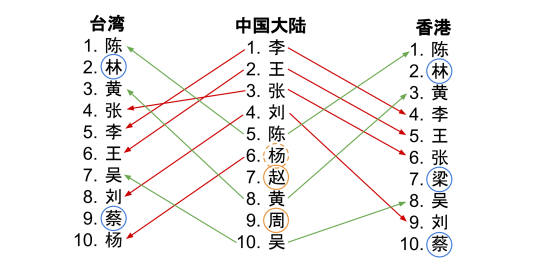
Arrows: green = higher than Mainland rank, red = lower than Mainland rank
Circles: orange = in Mainland top 10 but missing from the HK and/or TW top 10, blue = outside Mainland top 10
I was actually surprised how similar the top 10s are for Taiwan and Hong Kong!
I also wanted to compare Taiwan and Hong Kong to Fujian and Guangdong, respectively. These are the two provinces in Mainland China that they are closest to.
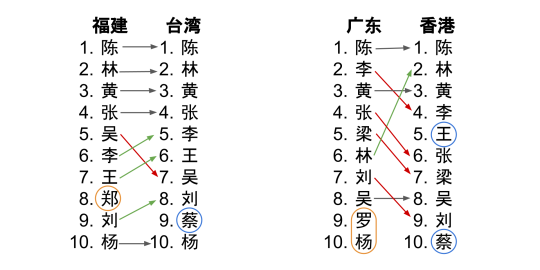
Now, I’m no history expert, but I know that a lot of Taiwanese have roots in Fujian, so it makes a lot of sense that their top 10 lists look so similar. I don’t know much about the history of migration to Hong Kong, but as such a major economic center, I’m guessing people from all over China came to Hong Kong.
Thank you!
If you actually read this whole post, I’m impressed. Thank you!
I initially began working on this post in September 2021. Needless to say, this post ended up being a lot longer and taking up a lot more of my time than I had anticipated. I asked my dad to read over an earlier draft of this post for me, and he literally asked me, “why are you doing this?” I didn’t really have a concrete answer. I just thought it would be interesting to explore surnames a bit. And so here we are :)
Extended list - 大陆25大姓氏
- 李 Lǐ
- 王 Wáng
- 张 Zhāng
- 刘 Liú
- 陈 Chén
- 杨 Yáng
- 赵 Zhào
- 黄 Huáng
- 周 Zhōu
- 吴 Wú
- 徐 Xú
- 孙 Sūn
- 胡 Hú
- 朱 Zhū
- 高 Gāo
- 林 Lín
- 何 Hé
- 郭 Guō
- 马 Mǎ
- 罗 Luó
- 梁 Liáng
- 宋 Sòng
- 郑 Zhèng
- 谢 Xiè
- 韩 Hán
